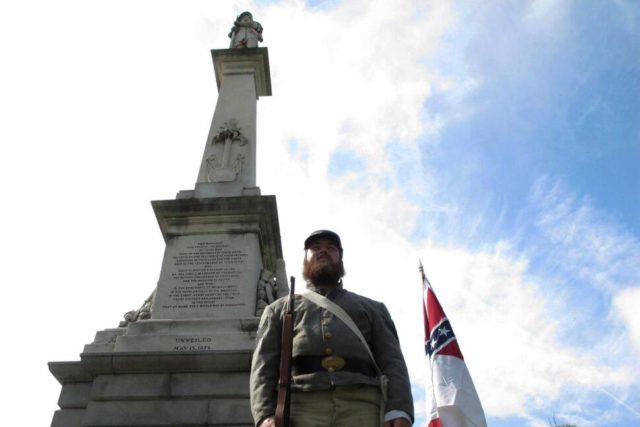The South Carolina Supreme Court ruled this week that a state law preventing the removal of a Confederate monument or changing a historical name of a street or building is legal.
The removal or change would require action by the state legislature, the court decided.
The Associated Press reported that the decision keeps intact the South Carolina Heritage Act, which has prevented removals and renaming in the state after other states did just that following the death of George Floyd last year while in the custody of the Minneapolis police:
The law was passed in 2000 as part of a compromise to remove the Confederate flag from atop the South Carolina Statehouse dome. The rebel banner was moved to a pole on the capitol lawn, where it flew until 2015 when lawmakers removed it after nine black church members were killed in a racist massacre at a Charleston church.
The law specifically protects monuments from 10 wars — from the Revolutionary War to the Persian Gulf War. It also protects monuments honoring African Americans and Native Americans as well as a catchall phrase of “any historic figure or historic event.”
The AP reported that in the same decision the justices struck down a requirement that two-thirds of the South Carolina General Assembly must approve a move or name change.
Lawmakers in South Carolina said after the flag was removed in 2015 said they would not take further action to erase the state’s heritage.
South Carolina Senate President Harvey Peeler said in the summer of 2020 that “changing the name of a stack of bricks and mortar is at the bottom of my to-do list,” the AP reported.
Peeler issued a statement after the court decision.
“The protections over all of our state’s monuments and statues were ruled constitutional and they will remain in place,” he said. The AP reported:
Much of Wednesday’s 22-page ruling traced the history of the 2000 compromise, praising it for soothing racial tensions in the state. It was signed by all justices, including Chief Justice Don Beatty, who is just the second African American to lead the high court.
“As individual citizens — even Justices — we might look back on these events and wish the negotiations had been handled differently. The reality, however, is the Heritage Act brought the Confederate flag down from atop the seat of South Carolina sovereignty,” Associate Justice John Cannon Few wrote in the ruling.
The justices also rejected the argument that the Heritage Act violated “home rule” in South Carolina and illegally gave the General Assembly power over local affairs.
“They contend local governments are in a better position to act with regard to this subject because ‘they can be more responsive’ to the thoughts of the community. This may be true, but Home Rule is not about who holds the better wisdom,” Few wrote.
One of the people who sued lawmakers over the Heritage Act is the widow of state Sen. Clementa Pinckney, the pastor at Emanuel AME church in Charleston who died in the 2015 attack.
The case is Pinckney v. Peeler, No. 28062 in the South Carolina Supreme Court.
Follow Penny Starr on Twitter or send news tips to pstarr@breitbart.com.

COMMENTS
Please let us know if you're having issues with commenting.